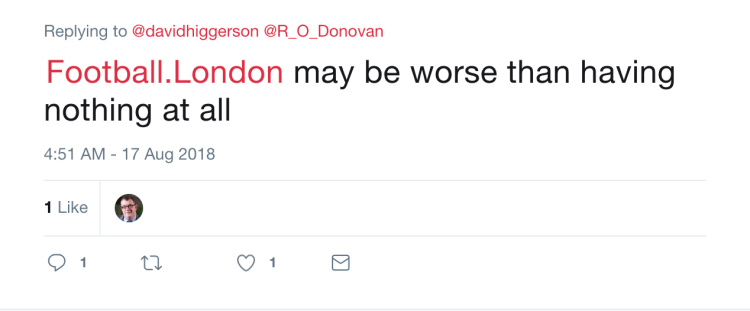It’s taken two weeks, a lot of hot air (from me included) to get to a place where we can have a sensible debate about how to make football journalism work in the digital age.
What started with a disgruntled journalist’s claims of clickbait, low-quality content and the linking of not covering Brentford to not being on the ground ahead of the Grenfell tragedy, has matured into a debate into a sensible discussion, assuming you don’t spend too much time on holdthefrontpage.
Here’s what triggered Jim Levack’s disquiet: Reach, the company I work for, has changed the way it covers football in London over the last two years. This has resulted in the launch of the rapidly-growing Football.London site, which focuses on Premier League clubs but has also begun to cover Championship clubs and those in other leagues in more depth.
As a result, coverage of clubs traditionally associated with Reach’s weekly London titles has moved to football.london. Our aim is deliver large enough audiences through the mass-reach Premier League clubs to be able to sustain full coverage of clubs with smaller fanbases.
Sadly, at the same time, it was clear the way we covered Brentford – Jim’s club – wasn’t sustainable because the audience needed wasn’t there. So we’re trying to find new ways to cover a club whose fans weren’t turning to us in large enough numbers to maintain the status quo.
I can see where Jim’s frustrations come from, even if his analysis of digital journalism is somewhat off the mark. If you value something, and it’s taken away, it makes you cross.
It is a microcosm of the challenge facing the industry: When our belief in what’s important meets business reality, what do you do?
Whisper it quietly, but holdthefrontpage blogger and passionate local journalism advocate Steve Dyson, helped steer this debate into constructive territory, by discussing whether you can cover a football club with any credibility if you aren’t there week in, week out.
Steve’s view is clear: No, you can’t. And it’s a view many in local journalism share. To be clear, I’m not advocating that anyone would choose not to be at a game week in, week out as it is the most obvious way to build credibility amongst fans (although there are plenty of examples where it can also cause bother).
But what do you do when covering a club the way we always have done doesn’t drive enough digital readers to sustain the level of coverage?
Where I disagree with Steve is that being in the press box week in, week out is the only way to be a credible source of information about a club. Plenty of national journalists have proven time and again that they don’t need to be in the press box on a Saturday to break big stories, and plenty of digital only sites too.
I also work with a lot of football journalists who don’t go to the game every week, but do go regularly. This is because some of the football desks I work with have more football journalists than they have had for a number of years, and it’s simply impractical to expect to send everyone (and also not what fans want, based on audience data).
I also know journalists who break brilliant club news – as opposed to team news – by being fans of clubs, or building contacts up in the same way you might if you were a crime reporter. Good stories and contacts come from many locations.
And I also know plenty of football journalists whose integrity is regularly attacked by football fans on fan forums despite being at games week in, week out.
Given the choice, you’d always put someone in the press box, but sometimes business realities prevent the ideal choice from being what happens. When the business reality is directly linked to audience volume – and by extension, appreciation – of what you do, that’s something journalism can’t afford to ignore.
As my colleague Jon Birchall, who leads our digital sports operations, said last night:
While one Tweet flagged up by Steve summed up the options:

Clearly, I disagree, and the fact we have a profitable London website sustaining football journalism suggests many of its readers disagree too.
Alex Turner, a former colleague at the Liverpool Daily Post, who now runs Businessdesk.com, posed this question:

In my experience, no two football clubs are the same. Size of audience is driven by many factors: Competition, how well tuned in journalists are to what fans are thinking, how well tuned in newsrooms are to what fans want, size of non-attending fan base and, of course, how well or otherwise the club is doing.
Hand-wringing about losing credibility because we’re not doing things the way we always have done might be cathartic, but it doesn’t change the realities: for any local journalism to survive, it needs to be sustainable. It doesn’t matter if you’re a plc, or an independent family company: If you can’t cover your costs, journalism suffers, as fans of Oldham Athletic would surely tell you following the collapse of their daily paper last year.
My conclusion is that local journalism’s challenge is simple: How do we make sure enough people read what we do to continue to be able to do it the way we think is best? As widely noted on Twitter, for some institutions, we’re maybe too late.
That’s the discussion which needs to be had, and (unusually for this blog!), we should probably thank Steve Dyson for finessing a debate along those lines. I may not agree with his view that credibility only becomes possible if you’re in the press box, based on what I see and hear, but nobody would deny being familiar in the press box is an essential part of covering sport credibly. But even essentials need to be paid for.
And as journalists, we need to play our part in making that happen in a way we are happy with.